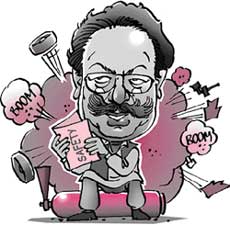TRANSPORT MINISTRY
 The cse panel of experts after completing their investigation concluded, "In an international perspective, we consider the safety level of the buses to be acceptable. However, there are still items or manufacturing operations that could be further improved in order to minimise the risk of unwanted incidents.' Based on their suggestions, cse has written to the mrth proposed several changes in the notification:
The cse panel of experts after completing their investigation concluded, "In an international perspective, we consider the safety level of the buses to be acceptable. However, there are still items or manufacturing operations that could be further improved in order to minimise the risk of unwanted incidents.' Based on their suggestions, cse has written to the mrth proposed several changes in the notification:
• All cng buses must undergo an inspection of the engine and high-pressure fuel storage system before being allowed on the road. Subsequently, this check should be carried out annually for safety compliance.
• mrth must notify the technical and legal requirements for the authorisation of the conversion workshops. As of now, kit installation on vehicles be carried out by workshops authorised by the kit manufacturer/kit supplier. But the minimum requirements for these workshops, either legal or technical, have not been defined by the mrth . We can't allow any roadside mechanic to fit cng kits.
• All converted/retrofitted buses must meet Euro II emissions standards and not the emissions standards meant for diesel and petrol vehicles in their year of manufacture to eliminate the possibility of bad conversion that can lead to both safety hazards and poor emissions. Euro IV standards should be notified for cng buses as soon as possible with the help of economic incentives for these vehicles.
• Engine converters must obtain a new type approval for each separate diesel engine model they seek to retrofit. Current regulations allow extension of the type approval certificate to other engine/ cng -kit combinations than the one originally submitted for type approval. This can result in unacceptable exhaust emission levels. Since the number of diesel engine models used in Delhi buses is small
Related Content
- Judgment of the National Green Tribunal regarding plywood factories operating in Yamuna Nagar, Haryana, 27/05/2025
- Order of the National Green Tribunal regarding illegal auction of sand blocks from river Subarnarekha, within district Jhargram, West Bengal, 03/04/2025
- Order of the Bombay High Court regarding construction of a jetty project by Adani Cementation Limited in Raigad district, Maharashtra, 05/03/2025
- Order of the Supreme Court regarding rising vehicular pollution in Delhi NCR, 20/01/2025
- Judgment of the Supreme Court regarding decision to construct a commercial airport in Silchar, Assam, 06/05/2024
- Judgment of the National Green Tribunal regarding noise pollution at airports, 21/03/2024
